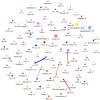Mendelian randomization analysis reveals causal factors behind diabetic nephropathy: evidence, opportunities, and challenges
- PMID: 39735650
- PMCID: PMC11671268
- DOI: 10.3389/fendo.2024.1444808
Mendelian randomization analysis reveals causal factors behind diabetic nephropathy: evidence, opportunities, and challenges
Abstract
Diabetic nephropathy (DN), as the most serious minor vascular complication of diabetes, imposes a significant socioeconomic and medical cost around the world, and its prevention and treatment are a major challenge in the current medical community. Observational studies and randomized controlled trials have revealed protective and risk factors for some DN. However, the conclusions of these researches may be influenced by several types of confounding. Mendelian randomization is a new epidemiological method mainly used to infer the causal relationship between exposure and outcome. Many Mendelian randomization studies have found potential causal relationships between DN and some diseases and lifestyle habits, thus providing valuable data for future mechanistic studies as well as the development and implementation of clinical prevention strategies. As a result, the purpose of this review is to evaluate the published Mendelian randomization study of DN, using the bibliometric research method, analyze the current research status and hot spots, and further summarize the genetic evidence about the potential protection of DN and risk factors to provide new inspiration for the etiology of DN and as a reference for clinical intervention.
Keywords: Mendelian randomization; bibliometrics analysis; causal relationship; diabetic nephropathy; genetic variation.
Copyright © 2024 Huang, An, Tang, Leng, Zhang, Wan, Han, Luo and Xie.
Conflict of interest statement
The authors declare that the research was conducted in the absence of any commercial or financial relationships that could be construed as a potential conflict of interest.
Figures






References
-
- Magliano DJ, Boyko EJDA. IDF DIABETES ATLAS. Brussels: International Diabetes Federation; (2021). - PubMed
-
- Lim SC, Dorajoo R, Zhang X, Wang L, Ang SF, Tan C, et al. Genetic variants in the receptor for advanced glycation end products (RAGE) gene were associated with circulating soluble RAGE level but not with renal function among Asians with type 2 diabetes: a genome-wide association study. Nephrol Dial Transplant. (2017) 32:1697–704. doi: 10.1093/ndt/gfw263 - DOI - PubMed
Publication types
MeSH terms
LinkOut - more resources
Full Text Sources
Medical
Research Materials

